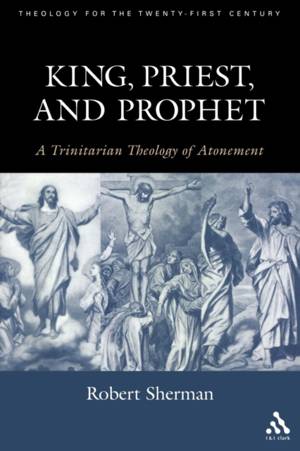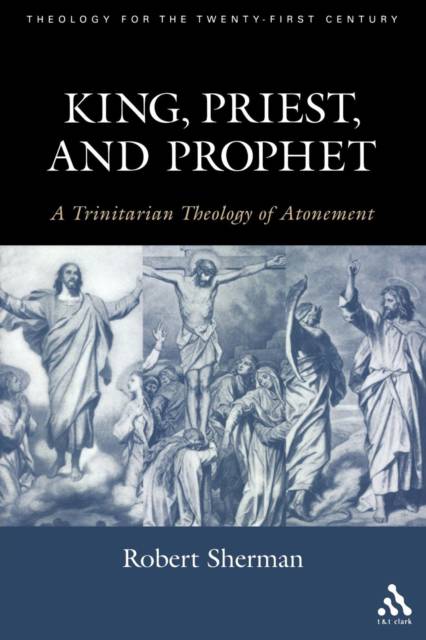
- Retrait gratuit dans votre magasin Club
- 7.000.000 titres dans notre catalogue
- Payer en toute sécurité
- Toujours un magasin près de chez vous
- Retrait gratuit dans votre magasin Club
- 7.000.0000 titres dans notre catalogue
- Payer en toute sécurité
- Toujours un magasin près de chez vous
169,95 €
+ 339 points
Description
The doctrines of the atonement and the Trinity are central not only to the Christian faith but also to Christian systematic theology. Over the last decade or so, one or another theological interpretation of either of these doctrines has assumed pride of place among theologians. Before Robert Sherman, though, no theologian has ever dared to read the atonement in light of the Trinity. Most of the time atonement theories simply focus on the redeeming work of Jesus Christ, without any reference to Christ's relationship to the Father and the Spirit of the Trinity.
But, as Sherman argues, Christ's atoning work is diverse and cannot be limited to one who ransoms our sins or to one who has victory over our sins (although in Sherman's view Christ's atoning work includes these tasks and more). He offers here a constructive theological proposal that connects Trinity with the rubrics of prophet, priest, and king to help explain Christ's atoning work. One can understand adequately neither Christ's multifaceted reconciliation of a complex humanity to God nor that reconciliations fundamental unity as God's gracious act apart form the Trinity. Without this framework, one will likely stress one person of the Trinity, one aspect of God's reconciling work, and/or one understanding of the human predicament to the exclusion of others and the detriment of theology, both systematic and pastoral. Sherman's constructive theological proposal suggests that we should recognize a certain correspondence and mutual support between the three persons of the Trinity, the three offices of Christ (king, prophet, priest), and the three commonly recognized models of his atoning work (Christus victor, vicarious sacrifice, moral exemplar). Sherman's book offers a well-nuanced and well-grounded constructive theology of Trinitarian atonement and is a significant addition to the Theology for the Twenty-First Century Series.
Robert J. Sherman is Professor of Christian Theology at Bangor Theological Seminary in Maine. His work has appeared in such publications as the Scottish Journal of Theology, the International Journal of Systematic Theology, and The Journal of Religion.
But, as Sherman argues, Christ's atoning work is diverse and cannot be limited to one who ransoms our sins or to one who has victory over our sins (although in Sherman's view Christ's atoning work includes these tasks and more). He offers here a constructive theological proposal that connects Trinity with the rubrics of prophet, priest, and king to help explain Christ's atoning work. One can understand adequately neither Christ's multifaceted reconciliation of a complex humanity to God nor that reconciliations fundamental unity as God's gracious act apart form the Trinity. Without this framework, one will likely stress one person of the Trinity, one aspect of God's reconciling work, and/or one understanding of the human predicament to the exclusion of others and the detriment of theology, both systematic and pastoral. Sherman's constructive theological proposal suggests that we should recognize a certain correspondence and mutual support between the three persons of the Trinity, the three offices of Christ (king, prophet, priest), and the three commonly recognized models of his atoning work (Christus victor, vicarious sacrifice, moral exemplar). Sherman's book offers a well-nuanced and well-grounded constructive theology of Trinitarian atonement and is a significant addition to the Theology for the Twenty-First Century Series.
Robert J. Sherman is Professor of Christian Theology at Bangor Theological Seminary in Maine. His work has appeared in such publications as the Scottish Journal of Theology, the International Journal of Systematic Theology, and The Journal of Religion.
Spécifications
Parties prenantes
- Auteur(s) :
- Editeur:
Contenu
- Nombre de pages :
- 304
- Langue:
- Anglais
- Collection :
Caractéristiques
- EAN:
- 9780567025609
- Date de parution :
- 02-03-04
- Format:
- Livre broché
- Format numérique:
- Trade paperback (VS)
- Dimensions :
- 153 mm x 230 mm
- Poids :
- 489 g

Les avis
Nous publions uniquement les avis qui respectent les conditions requises. Consultez nos conditions pour les avis.






